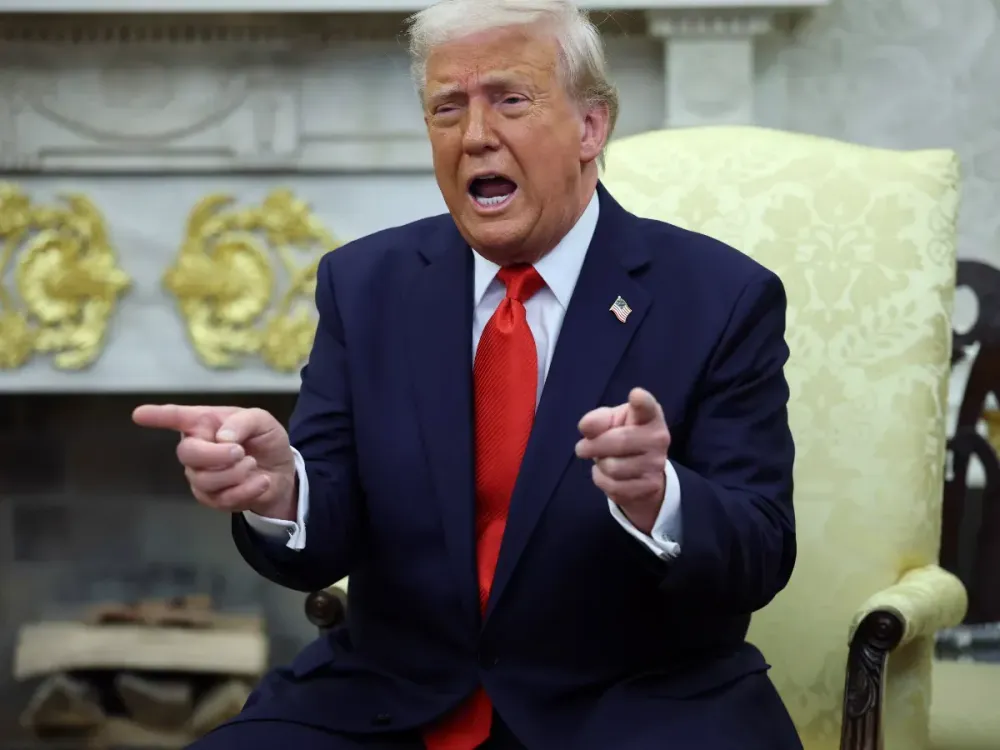Advertisement|Remove ads.
Trump Joins Japan Talks On Tariffs, Defense Costs In Surprise Move

President Donald Trump said Wednesday he will attend a meeting between the U.S. and Japanese officials to discuss trade and tariffs, signaling a more hands-on approach to negotiations that began after his administration imposed sweeping levies on dozens of countries.
Japan sent Economic Revitalization Minister Ryosei Akazawa to Washington expecting to meet Treasury Secretary Scott Bessent and U.S. Trade Representative Jamieson Greer, according to a report by Reuters. Tokyo had planned to keep the talks focused on trade and investment.
However, Trump announced on Truth Social that he would join the meeting and expand the agenda to include military cost-sharing and what he called “trade fairness.”
“Japan is coming in today to negotiate Tariffs, the cost of military support, and ‘TRADE FAIRNESS,’” Trump wrote. “Hopefully something can be worked out which is good (GREAT!) for Japan and the USA!”
Japan is the first country to secure in-person negotiations with the Trump administration since the rollout of “reciprocal” tariffs earlier this month.
While the tariffs were paused for 90 days, Tokyo remains subject to a 25% duty on car exports and a baseline 10% levy applied to most U.S. trading partners.
The talks follow Japanese Prime Minister Shigeru Ishiba’s warning of a “national crisis” stemming from Trump’s trade measures. Japan is the largest foreign investor in the U.S. and hosts more American troops than any other country.
The inclusion of defense costs in the trade conversation marks a shift in the administration's approach to longstanding alliances. Trump has consistently argued that allies do not contribute enough to shared military commitments.
According to the U.S. International Trade Commission, vehicles and parts make up a third of U.S. imports from Japan. Fuels, pharmaceuticals, and industrial equipment lead American exports to Japan.
U.S. automakers face higher costs due to tariffs on imported parts. In contrast, Japanese automakers like Toyota, Honda, Nissan, Mazda, and Subaru, which import vehicles into the U.S., are worried about increasing production costs.
Nissan, for example, announced on Tuesday that it will cut Japanese production of top-selling U.S. models due to the tariffs, as per a Reuters report. Japanese firms are also shifting production to Southeast Asia to mitigate tariff impacts.
The meeting is scheduled for 10:30 a.m. Eastern, though it was unclear whether it began on time. U.S. markets were lower on Wednesday, with the Invesco QQQ Trust (QQQ), which tracks the tech-heavy Nasdaq 100, down as much as 1.68% and the SPDR S&P 500 ETF Trust (SPY), which tracks the S&P 500, down 1.12%.
For updates and corrections, email newsroom[at]stocktwits[dot]com.











/filters:format(webp)https://news.stocktwits-cdn.com/large_Getty_Images_2259256580_jpg_e72ea8ddc5.webp)
/filters:format(webp)https://news.stocktwits-cdn.com/jaiveer_jpg_280ad67f36.webp)
/filters:format(webp)https://news.stocktwits-cdn.com/large_supermicro_resized_jpg_95d12828d5.webp)
/filters:format(webp)https://news.stocktwits-cdn.com/Aashika_Suresh_Profile_Picture_jpg_2acd6f446c.webp)
/filters:format(webp)https://st-everywhere-cms-prod.s3.us-east-1.amazonaws.com/large_UWM_resized_f22f7e06b8.jpg)
/filters:format(webp)https://st-everywhere-cms-prod.s3.us-east-1.amazonaws.com/large_sealsq_stock_market_representative_resized_b05435011f.jpg)
/filters:format(webp)https://st-everywhere-cms-prod.s3.us-east-1.amazonaws.com/unnamed_jpg_9dff551b50.webp)
/filters:format(webp)https://news.stocktwits-cdn.com/large_Getty_Images_2229918735_jpg_e905cbd5e3.webp)
/filters:format(webp)https://news.stocktwits-cdn.com/large_Getty_Images_1445160636_jpg_9759816169.webp)